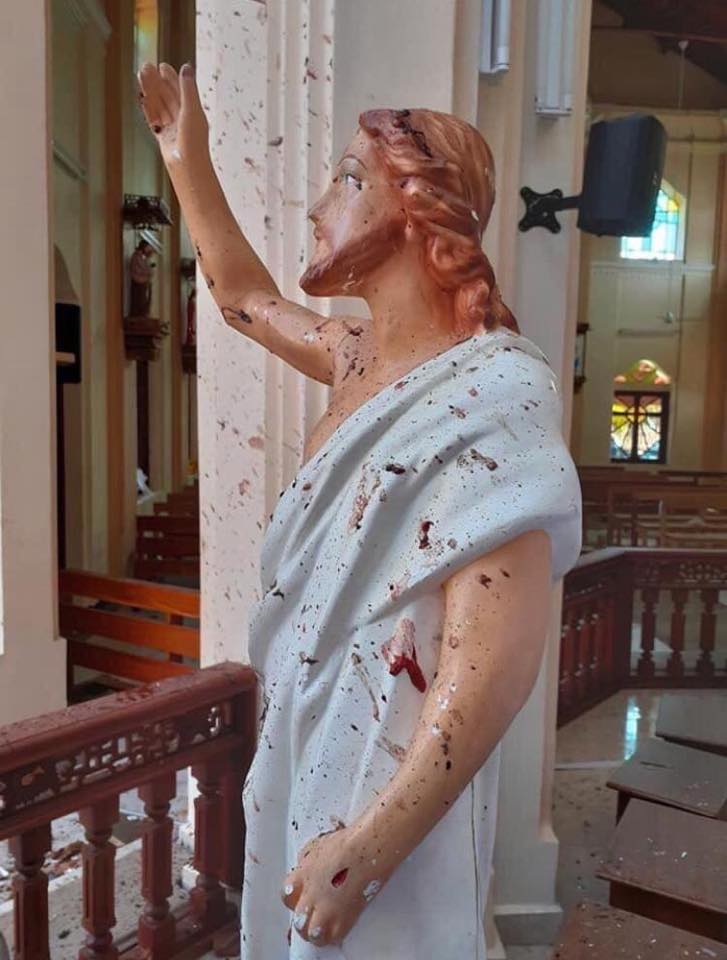
Weeks before coordinated bombings ripped through churches and luxury hotels — killing nearly 300 people on Easter Sunday — authorities in Sri Lanka received warnings a domestic radical Muslim group would attack the nation on the Christian holy day.
Despite multiple warnings from international intelligence agencies, however, Sri Lanka’s security officials reportedly failed to heed the alerts and apparently took no action to protect against a potential attack. Authorities were first alerted to the threat April 4.
More than two weeks later, near-simultaneous blasts detonated at three churches and three luxury hotels in and around Colombo, the capital city. Two more explosions occurred hours later outside of Colombo – one at a guesthouse and the other near an overpass.
At least 290 people – including 39 foreigners – were killed and more than 500 people were injured. The government on Monday said the attacks were likely perpetrated by local militant group National Thowfeek Jaamath, a little-known radical Islamist organization.
Experts told the New York Times the group promotes an Islamic terrorist ideology.
“These attacks appear to be quite different and look as if they came right out of the ISIS, Al Qaeda, global militant jihadist playbook, as these are attacks fomenting religious hatred by attacking multiple churches on a high religious holiday,” Anne Speckhard, the director of the International Center for the Study of Violent Extremism, told the newspaper.
Health Minister Rajitha Senaratne said international agencies warned of possible attacks several times beginning in early April. He said the defense ministry wrote to the police chief on April 9 to give law enforcement a heads up about the intelligence, including providing the group’s name.
Two days later, on April 11, police wrote to the heads of security of the judiciary and diplomatic security division about the warnings. It was not immediately clear what action, if any, was taken in response.
Top government officials, including Prime Minister Ranil Wickremesinghe and his Cabinet, were reportedly kept in the dark about the intelligence until after the attack – which Senaratne blamed on political dysfunction within the government.
“We must look into why adequate precautions were not taken,” Wickremesinghe said Sunday.
An investigation has been launched into the apparent breakdown of communication within the government.
A forensic analysis of body parts found at six sites determined seven suicide bombers conducted the coordinated assault. Most attacks were carried out by single bombers, but two men targeted the Shangri-La Hotel in Colombo.
Officials said all the bombers were Sri Lankan citizens, but authorities said foreign links to the plot were suspected. At least 24 suspects were in custody for questioning.
On Monday, a van that had been parked since Sunday near St. Anthony’s Shrine – one of the churches targeted in the attack – exploded. No injuries were reported after that blast.
Police said they went to inspect the van after people reported it had not been moved in more than a day. Inside, cops discovered three bombs that they tried to defuse. Instead, the bombs detonated, sending panic-stricken pedestrians fleeing.
Authorities said a large bomb had been found and defused late Sunday on an access road to the international airport.
Cardinal Malcolm Ranjith, the archbishop of Colombo, said the attacks could have been thwarted.
“We placed our hands on our heads when we came to know that these deaths could have been avoided. Why was this not prevented?” he said.
The U.S. State Department confirmed “several” Americans died in the attacks and on Sunday issued a revised travel warning to Sri Lanka, saying terror groups continue to plot and may possibly carry out new attacks in hotels and churches.
The alert said possible targets include tourist locations and transportation hubs, noting the terrorists “may attack with little or no warning.”
The Sri Lankan government initially lifted a curfew that had been imposed during the night but reinstated it Monday afternoon. Most social media remained blocked Monday after officials said they needed to curtail the spread of false information and ease tension in the country of about 21 million people.
The Associated Press contributed to this report.
Lucia I. Suarez Sang is a Reporter & Editor for FoxNews.com.





















